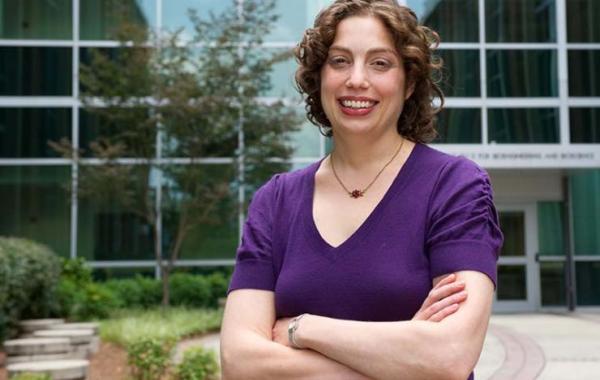Raquel Lieberman Is Having A Great Year, and It’s Only February

Raquel Lieberman, associate professor at the School of Chemistry and Biochemistry, is having the Best. Winter. Ever.
That is, as long as you don’t count that whole Super Bowl thing.
Lieberman has started the year with excellent news: She’s been asked to serve on the academic editorial board of a major scientific journal, and she and her research team – the Lieberman Lab - can continue their work on early-stage glaucoma, thanks to this month’s renewal of a $1.48 million National Institutes of Health (NIH) grant.
“We had known since June that the grant score we got was meritorious,” Lieberman says. “But you can’t count your chickens before they hatch.”
If any birds have learned that the hard way, it’s the Atlanta Falcons. In the days before Super Bowl LI proved that point, Lieberman patiently waited to hear about her grant request.
Her spirits got a boost early this month when Georgia Tech’s Office of Sponsored Programs – the Institute’s support department for research administration – told her it needed to do some budget updating. “Which is a good sign,” she says.
“But then the Falcons lost.”
Lieberman was determined to not let that painful collapse jinx her hopes or dampen her mood. Sure enough, the very next morning, Lieberman learned from NIH that she could continue her work and keep her staff of researchers employed for the next four years.
After the first five years of funding, “four more will be nine years straight of working on this exact same line of questioning, which is super, super gratifying,” she says. “We didn’t have anything in the beginning, just very basic observations. Because we were able to make important contributions to the field, NIH has given us more money to continue. That’s a huge milestone.”
The path to success has included two advances in understanding glaucoma, a collection of eye diseases that make up the second leading cause of blindness worldwide.
Lieberman’s Lab focuses on the protein myocilin. When the gene encoding for myocilin has a defect, the resulting mutant protein is toxic to the part of the eye responsible for controlling eye pressure. Mutant myocilin accumulates, preventing the easy flow of aqueous humor fluid and raising eye pressure, which can damage the optic nerve. Myocilin-associated glaucoma is hereditary and early-onset, affecting the vision of children and adults through approximately age 35, Lieberman says.
“If you gunk up the molecular sieve that lets fluid drain out of the eye, the pressure goes up,” Lieberman said. “This mutant protein kills the cells that are making sure that the sieve stays appropriately porous.”
In 2014, the Lieberman Lab and collaborators at the University of Kansas and South Florida announced that they had identified molecules that could serve as drugs to block the impact of mutant myocilin. The next year, Lieberman’s lab announced it had solved the three-dimensional structure of a particular domain in myocilin – the olfactomedin (OLF) - that is tied to early-onset glaucoma.
OLF is where most of the protein mutations are documented in patients, and the new NIH grant will support studies that will help unlock more of myocilin’s mysteries.
Lieberman’s fantastic February also includes the news that she’ll serve a three-year term as an academic editorial board member for PLoS (Public Library of Science) Biology. The high-impact publication is known for spotlighting innovative research throughout the biological sciences. But before getting excited about the email inviting her to join PLoS Biology, she had to make sure it was the real thing.
“Nowadays, if you’re an academic researcher, every morning you wake up to a lot of emails from people and entities you’ve never heard of inviting you to present at conferences or to submit manuscripts to journals. Because I get this spam all the time, I had to pause and realize this invitation was in fact the real deal.”
Lieberman will be handling the review of up to two articles each month, setting up peer reviews and helping to determine whether they should be accepted or rejected.
“I have a lot of experience with rejection,” she jokes. “PLoS Biology has high expectations,” she says, seriously. “We’ll see what comes down the pike. I’m very excited.”
In her editorial role, Lieberman can also help fellow Georgia Tech researchers navigate the PLoS Biology process for their own papers. “I want people around here to know that I can help facilitate their submissions,” she says. “I can’t officially be the editor for an article that’s from Georgia Tech, but I can help send them to somebody else.”

